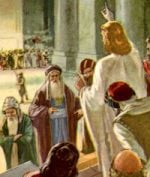Fathers of the Church
Epistle LXVI: to Athanasius, Presbyter
by Gregory the Great in 590-604 | translated by James Barmby, D.d
Gregory to Athanasius, Presbyter of Isauria.
As we are afflicted and mourn for those whom the error of heretical pravity has cut off from the unity of the Church, so we rejoice with those whom their profession of the catholic faith retains within her bosom. And, as it is our duty to oppose the impiety of the former with pastoral solicitude, so it is fitting for us to bestow favour on the pious professions of the latter, and to declare their views to be sound. And accordingly, a suspicion of unsoundness in the faith having arisen against thee, Athanasius, presbyter of the monastery of Saint Mile, called Tamnacus, which is established in the province of Lycaonia, thou, in order that the integrity of the profession of faith might appear, didst elect to have recourse to the Apostolical See over which we preside, asserting also that, having been corporally chastised, thou hadst done some things unjustly and impetuously. And, although things done under compulsion by no means fall under the censure of the canons, and they are rightly accounted to be of no weight (since he himself invalidates them who compels what is unjust to be confessed and done), and though that confession is rather to be received and embraced which is shewn to proceed from the spontaneous will, as is known to be the case in that which thou madest before us; — yet still, to avoid the possibility of uncertainty, we took the precaution of writing about thee to our brother and fellow-bishop, the prelate of the city of Constantinople, that he might inform us by letter of what had been done. He, after being often admonished by us, wrote in reply to the effect that a volume had been found in thy possession, which contained many heretical statements, and that on this account he had been incensed against thee. He having lent this to us in his desire to satisfy us, we read the earlier portions of it attentively: and inasmuch as we found in it manifest poison of heretical pravity, we forbade its being read any more. But, since thou hast assured us that thou hadst read it in simplicity, and, in order to cut off all ground for uncertain suspicion, hast handed to us a paper in thine own handwriting in which expounding thy faith, thou hast most plainly condemned all heresies in general, or whatever is opposed to the integrity of the Catholic faith or profession, and hast declared that thou hadst always received and didst still receive all that the four holy Ecumenical synods receive, and hadst condemned and didst still condemn what they condemn, and hast promised also to accept and hold to that synod which was held in the times of the emperor Justinian concerning the Three Chapters, and, being forbidden by us to read that same volume in which the poison of pestiferous error is interwoven, rejecting also and condemning all that in it is said or latently implied against the integrity of the Catholic faith, thou hast promised that thou wilt not read it again; — we, moved by these reasons (thy faith also having clearly appeared to us from the paper under thine own hand, God guarding thee, to be catholic), decree thee to be, according to thy profession, free from all stain of heretical perversity, and catholic; and we pronounce that thou hast proved thyself, by the grace of Christ Jesus our Saviour to be in all things a professor and follower of the unadulterated faith: and we give thee free licence, notwithstanding all, to return to thy monastery, resuming thy place and rank.
We wish to write also on this matter to our most beloved brother, the prelate of the city of Constantinople, who has been ordained in the place of the aforesaid holy John . But, since it is the custom that we should not write before his synodical epistle has reached us, we have therefore delayed. But, after it has reached us, we will inform him of these things when we find a convenient opportunity.
Taken from "The Early Church Fathers and Other Works" originally published by Wm. B. Eerdmans Pub. Co. in English in Edinburgh, Scotland, beginning in 1867. (LNPF II/XII, Schaff and Wace). The digital version is by The Electronic Bible Society, P.O. Box 701356, Dallas, TX 75370, 214-407-WORD.



